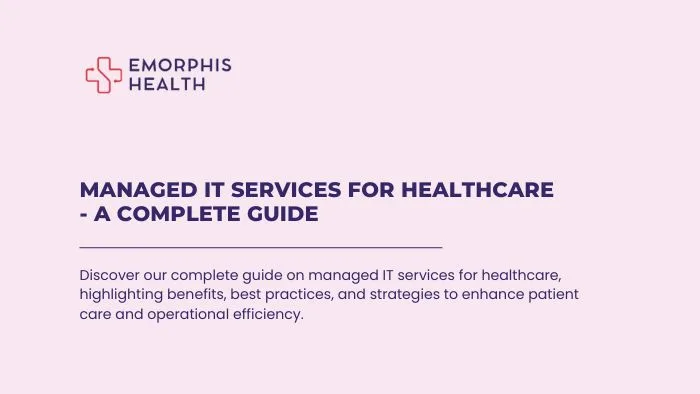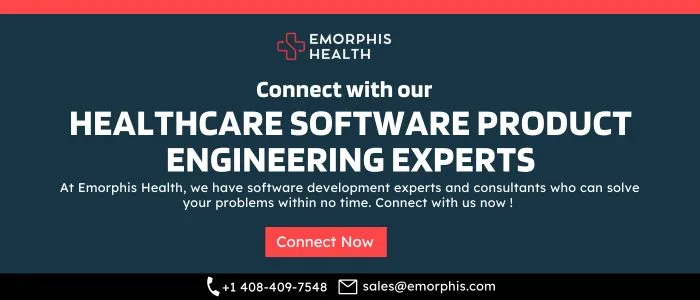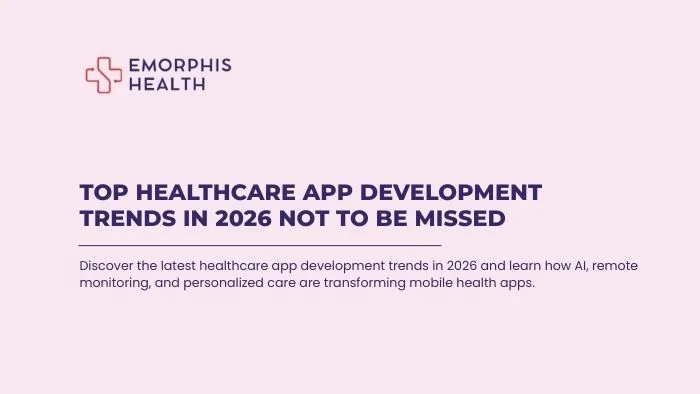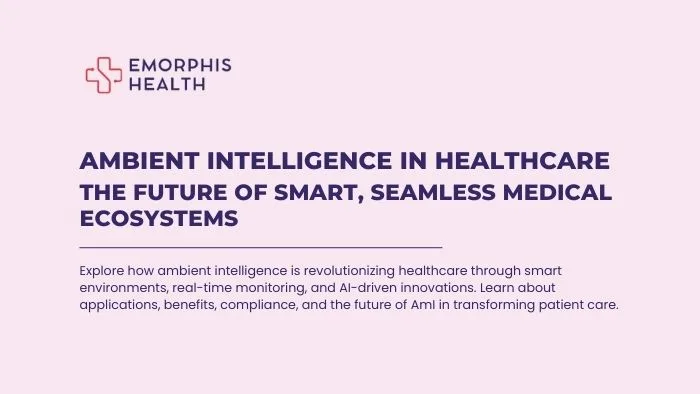Overview
See Contents
In the rapidly evolving landscape of healthcare, the integration of technology is not merely advantageous; it has become essential for delivering quality patient care and optimizing operations. Managed IT services are at the forefront of this transformation, providing healthcare organizations with the tools and support they need to navigate complexities and ensure efficiency.
This guide will explore the ins and outs of managed IT services for healthcare, providing insights into their benefits, selection criteria, and best practices for successful implementation.
Let’s Talk About Healthcare IT Managed Services
Healthcare IT managed services encompass a range of outsourced IT solutions designed to enhance operational efficiency, improve patient outcomes, and ensure compliance with regulations. These services include network management, data security, cloud solutions, electronic health records (EHR) management, and technical support, among others. As healthcare organizations increasingly adopt digital solutions, the role of managed services has grown significantly.
However, many organizations struggle with the complexities of managing their IT infrastructure effectively. By partnering with a managed services provider (MSP), healthcare organizations can access specialized expertise and resources, allowing them to focus on delivering exceptional care.
Why Use a Managed Services Provider?
The question of whether to utilize a managed services provider is crucial for healthcare organizations. Here are several compelling reasons why partnering with an MSP can be beneficial:
- Expertise and Specialization: Managed services providers bring a wealth of expertise in various aspects of healthcare IT. They understand the specific challenges and regulations that healthcare organizations face, enabling them to offer tailored solutions that meet unique needs. This expertise is particularly valuable in a sector where compliance with laws like HIPAA is paramount.
- Cost Efficiency: Managing IT in-house can be resource-intensive and costly. By outsourcing to an MSP, healthcare organizations can reduce operational costs while gaining access to advanced technology and skilled professionals. Research shows that organizations utilizing managed IT services can save up to 30% on IT costs, allowing funds to be redirected toward patient care initiatives.
- Scalability: Healthcare needs are dynamic, and managed services provide the flexibility to scale resources based on current requirements. Whether integrating new technologies or expanding to new facilities, MSPs can easily adjust services to accommodate growth and change.
- Enhanced Security: Cybersecurity is a pressing concern in healthcare, with data breaches becoming increasingly common. Managed services providers offer robust security measures, including threat detection, firewalls, and data encryption. Studies indicate that 85% of healthcare organizations that implement managed IT services report improved security postures, protecting sensitive patient information and ensuring compliance with regulations.
- Focus on Core Competencies: By outsourcing IT management, healthcare organizations can focus on their core mission: delivering high-quality patient care. This shift in focus allows staff to dedicate more time to patient interactions and care delivery rather than troubleshooting IT issues.
Can Managed Services Help Healthcare Organizations Grow?
Absolutely! Managed services can be a catalyst for growth in several ways:
- Streamlined Operations: Managed IT services help optimize various operational aspects, from administrative tasks to patient data management. For example, a study found that organizations leveraging data analytics can experience a 15% increase in patient satisfaction ratings. This improvement leads to better patient outcomes and higher retention rates.
- Data-Driven Insights: With managed IT services, healthcare organizations can access advanced data analytics capabilities. This empowers them to derive actionable insights from patient data, improving decision-making processes and enhancing the quality of care provided.
- Innovative Solutions: Partnering with an MSP opens the door to innovative technologies, such as telehealth, artificial intelligence, and remote patient monitoring. These solutions not only improve patient engagement but also expand service offerings, allowing healthcare organizations to reach a broader patient base.
- Regulatory Compliance: Managed security services providers are well-versed in healthcare regulations and compliance standards. They help organizations navigate these complexities, ensuring adherence to laws like HIPAA. Compliance not only avoids costly penalties but also fosters trust among patients and stakeholders.
How to Choose a Managed Services Provider
Selecting the right managed services provider is crucial for success. Here are some key factors to consider:
- Experience and Expertise: Look for an MSP with a proven track record in the healthcare sector. They should understand the unique challenges faced by healthcare organizations and have experience implementing solutions tailored to your needs.
- Service Offerings: Evaluate the range of services offered by the MSP. Ensure that they provide comprehensive IT solutions, including data security, network management, and support for EHR systems. The more services they offer, the better they can address your organization’s needs.
- Scalability: Choose a provider that can scale their services as your organization grows. This flexibility is essential for adapting to changing needs and technologies.
- Customer Support: Reliable customer support is vital. Ensure that the MSP offers 24/7 support and has a responsive team that can address issues promptly.
- Reputation and Reviews: Research the MSP’s reputation in the industry. Look for reviews, testimonials, and case studies to gauge their effectiveness and reliability.
Best Practices for Managed Services Success
To maximize the benefits of managed IT services, healthcare organizations should consider the following best practices:
- Define Clear Goals: Establish clear objectives for what you hope to achieve with managed IT services. Whether it’s improving patient satisfaction or enhancing data security, having specific goals will guide the partnership.
- Communicate Effectively: Maintain open lines of communication with your MSP. Regular meetings and updates will ensure that both parties are aligned, and any issues are addressed promptly.
- Invest in Training: Ensure that your staff is trained to work with the new technologies and processes introduced by the MSP. This investment in training will enhance overall efficiency and foster a culture of collaboration.
- Monitor Performance: Regularly assess the performance of your managed services provider. Use key performance indicators (KPIs) to evaluate their effectiveness and make necessary adjustments.
- Stay Informed: Keep abreast of industry trends and technological advancements. The healthcare IT landscape is continually evolving, and staying informed will help your organization remain competitive.
Conclusion
Managed IT services represent a vital component in the puzzle of modern healthcare. By partnering with a managed services provider, healthcare organizations can enhance operational efficiency, improve patient outcomes, and navigate the complexities of technology management. The benefits of outsourcing IT solutions are manifold, ranging from cost savings and scalability to enhanced security and compliance.
As healthcare continues to embrace technology, the importance of managed IT services will only grow. Organizations that leverage these services effectively will be well-positioned for success in an increasingly competitive landscape. By choosing the right provider and following best practices, healthcare organizations can ensure a fruitful partnership that ultimately enhances the quality of care they deliver.







